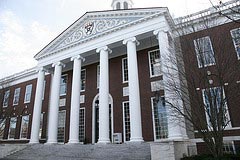
There seems to be a big deal about lists and college rankings. Let's face it, people love and are fascinated with lists. Top 10 lists, Top 100, etc.
A top 10 list can easily sway a student’s decision in what college they choose to attend. But, what if these college rankings are wrong? There is not a set standard or universal guidelines in ranking colleges. Every organization that does college rankings has their own set of guidelines and methodology.
Some say college rankings are just used as a device to sell more magazine or newspaper subscriptions. A few publications are getting around the scrutiny of these debatable rankings by offering a personalized "College Search". For example, The College Board website lets you enter your information into different college categories and suggests colleges that would be a good fit for you as a student.
There has been considerable debate over the methods used to create these rankings. In fact, many universities are considering opting out of yearly surveys and rankings sent out by the Princeton Review and US News & World Report, with many private liberal arts schools already doing so.
Other examples of colleges opting out are the schools who want to lose their label of being ranked as a top party school, which looks bad in the eyes of what is considered an academic institution.
It seems if a student does attend a top ranked college or elite Ivy League school, they are nearly guaranteed success. For example, studies have shown that if you attend a top 10 business school you will receive a higher salary than most others. These companies want you just because you attended and graduated from one of the best business schools in the nation, even though a student who attended a school not in the top 10 may have actually received a better education and may be better equipped for the job.
Here are some of the most popular college rankings:
- US News & World Report
Probably the most famous college ranking known to the public, as it has been published since 1983. It's important to note here that no public universities rank in the nation’s top twenty on this list.
- Princeton Review
The Princeton Review has a wide variety of college rankings, including Best Colleges, Jock Schools, Party Schools, and Happiest Students, just to name a few. Their rankings are based on survey feedback from more than 120,000 students across the nation. Their wide range of college rankings can be found in their book: The Best Colleges.
- Kaplan/Newsweek
Publishes a yearly list of the "Hottest Colleges". They interview admissions officials, educational consultants, students, parents, college and university leaders and high school counselors to create the ranking. They rank the number one hottest college in categories such as: The Hottest Ivy, Hottest Catholic School, Hottest Music School, and Hottest for Business.
- Washington Monthly
The Washington Monthly rankings are based on the contribution each university actually makes to the nation, specifically research, service, and social mobility. The research criterion is based on the amount of money the school receives from the Federal Government in research grants and the number of PHDs awarded. The service criterion ranks the school by students that go on to serve in the Peace Corps or ROTC and the percent of Federal Work-Study funds that goes to community service. Social mobility factors include how well schools graduate poorer students and if the school does a good job recruiting. It ranked this year’s #1 school as Texas A&M, while Texas A&M was ranked 62nd in the U.S. News & World Report ranking.
- Forbes
Forbes takes a look at the best business schools every two years. The ranking is based on student surveys on return on investment. The ROI of a Business MBA is calculated at five years salary after graduation minus tuition and the forgone salary during school.
- Wall Street Journal
The WSJ's Top Business Schools list is based on rankings of corporate recruiters' favorite M.B.A. programs.
- Bloomberg Businessweek
Every two years Bloomberg Businessweek comes up with its ranking of the best business schools. The rankings look at faculty, career services (help students get jobs) and overall customer satisfaction (both student and those that hire them).
- Kiplinger
Kiplinger ranks their colleges based on academic quality, cost, and financial aid. Of course tuition varies from in-state to out-of-state so they made rankings for both scenarios.
- CampusGrotto
CampusGrotto.com is famous for its list of most expensive colleges.
Other rankings done by Campus Grotto include Most Expensive Dorms, Most Beautiful College Libraries, Best Textbook Retailers, and Best College Internships.